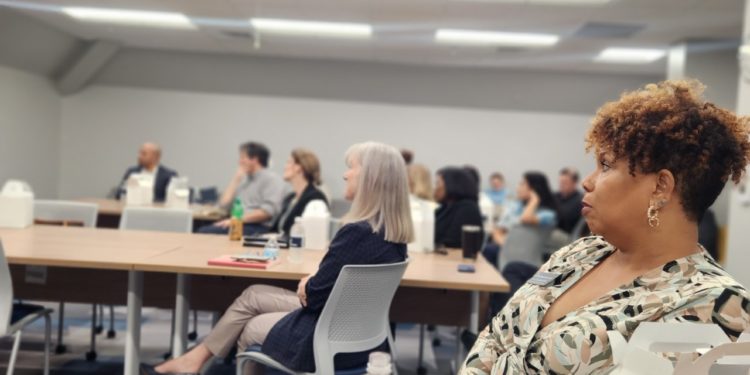“Being black on campus means that you have to work harder. It’s a fact.”
The words of Christon Adedoyin, a professor of social work in Samford’s School of Public Health, hung heavy in the air as educators from across campus gathered to share their experiences about what it means to be a Black professor at Samford.
On Wednesday, Feb. 22, Samford’s Office of Diversity and Intercultural Initiatives (ODII) hosted a faculty panel, “Cultivating Excellence in Teaching and Learning Spaces,” as a part of their ongoing Black History Month event series. Five professors from disciplines across Samford’s campus comprised the panel to discuss what it is like to be a Black educator in academia and strategies they implement to encourage growth in the classroom and on campus.
For Anthony Overton, a professor and chair of the department of biological and environmental sciences, being a part of the small number of Black faculty on campus means that he intentionally looks to cultivate relationships with minority students on campus.
“When you walk into a building or a room, you’re immediately looking for someone who looks like you, sounds like you, walks like you. It brings a level of comfort and a sense of belonging,” Overton said. “I make an effort to say hey I’m here. I offer that to every student, but, specifically, you want to connect [with minority students] because there’s not a lot of people here that look like them.”
The associate dean of the school of education, Monique Gardner Witherspoon, shared that she felt a similar responsibility to students of color. Witherspoon recalled specific examples of times when the parents of Black students sought her out to ask that she look after their children during their time at Samford.
“I go about this job in loco parentis- in the place of the parent,” Witherspoon said. “When we talk about our African American students, we have a huge responsibility to make sure that we serve in the place of the parent.”
Many people may not understand why these professors feel the need to cultivate such a connection with their minority students, but the panel referenced that each Black person on campus is connected through the commonalities of their experiences, despite the differences that exist between them.
Not every faculty member on campus experiences being Black the same way. International members of faculty have different experiences on campus based on other’s perceptions. According to Adedoyin, people behave differently around him before and after they hear his Nigerian accent.
“When people see me, they see a Black man. But when I speak, my accent reintroduces me to people that come across me,” Adedoyin said. “When people hear my accent, I can see their body language relax … when they find out that I’m not the traditional Black guy.”
Adedoyin explained that these experiences of people making assumptions about his appearance only add to the stress of being black on campus.
“It’s quite stressful to be Black on campus,” Adedoyin said. “I got to the point where the police chief on campus had to give me his private phone number because I had been stopped by campus police asking me ‘what are you doing here?’”
Although black people on campus face similar issues, Overton found it important to note that not every Black person has lived every black experience. For example, he has never been stopped by police on campus, and would find it difficult to comment on that situation.
“Sometimes you’re expected -because you’re Black- that certainly you have some huge level of connection [to every issue] and that’s not the case,” Overton said.
Niya Pickett Miller, an assistant professor of Communication Studies, said she feels similar frustrations about being stereotyped as a Black professor. Specifically, she struggles with the stereotype that because she is a Black professor, she is always willing to do emotional labor to promote diversity on campus.
“Here, there’s an assumption about my interest in all things diversity, as if I don’t have other matters that I am passionate or that I care about,” Miller said. “Because there are not a lot of faculty members that look like me, a part of my experience for now does include doing diversity work.”
To combat these assumptions, Miller often references her activism outside of campus to broaden conversations in her classes. She reiterated that she is interested in promoting inclusion on campus, but that there is so much more to what she can offer.
The professors on the panel shared that they each employ different methods to encourage excellence in the classroom setting based on their individual experiences. Overton expands lessons about science history to include the achievements of women and people of color so that every student in his class can feel connected to the field. Adedoyin approaches the topic of race through Samford’s Christian values and aims to help students understand the perspectives of others.
For Adedoyin, ongoing conversations about race on campus are a source of hope that encourages him to continue to strive for growth. He believes that Samford is in a position to create meaningful lasting change.
“I believe that excellence, brilliance and competency is colorless,” Adedoyin said. “We have a great opportunity at Samford to be a national model of racial healing.”

Editor-in-Chief





